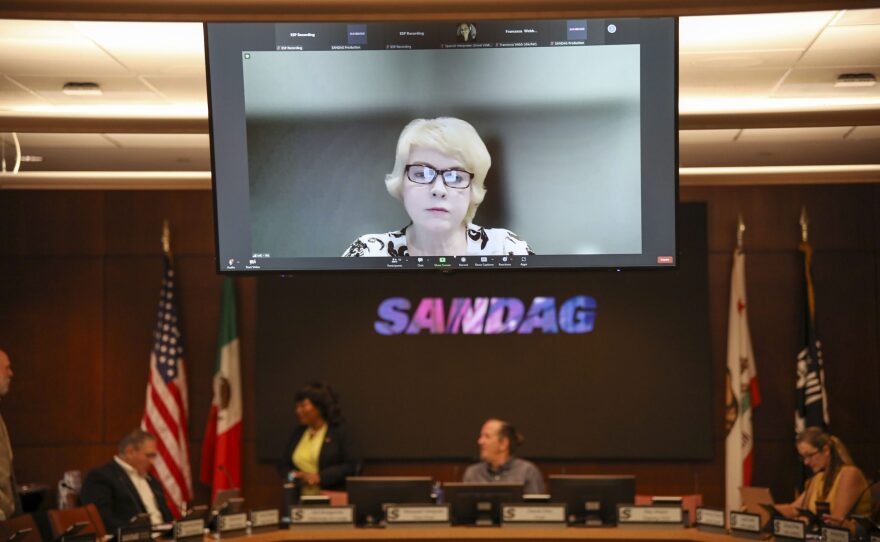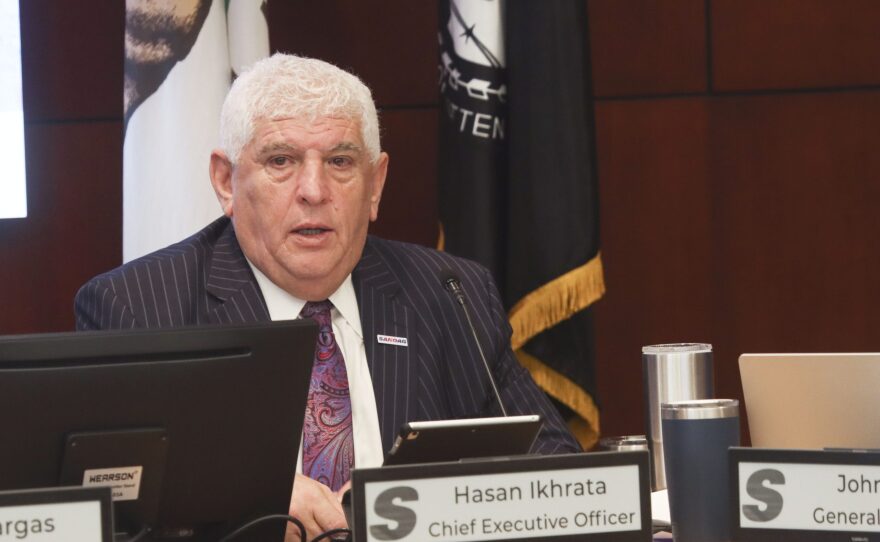A series of damning internal audits at the San Diego Association of Governments released in recent years have brought light to poor policies, improper spending and even resistance from agency leaders.
The most recent audit, as inewsource reported this week, showed that auditors find SANDAG’s contracts process concerning enough that they’re conducting further investigation on some matters and will refer findings to outside oversight agencies.
The next movement on the audit will come Friday, when the agency’s Audit Committee takes up the full report before SANDAG’s full board discusses it later this month.
What is SANDAG?
The San Diego Association of Governments is a taxpayer-funded agency that makes decisions on long-term planning for the region. While it’s best known for planning and funding public transportation, it also conducts criminal justice research and provides broad information dealing with the county’s quality-of-life issues.
SANDAG, a $1 billion agency with more than 400 employees, is governed by a board of directors comprising mayors, council members and county supervisors in the region.
But why are so many audits coming from the $1 billion regional planning agency? And what have the other audits revealed?
Since 2019, SANDAG has employed what’s known as the Office of the Independent Performance Auditor. Led by Mary Khoshmashrab, who previously held auditing positions at state and county agencies, the office’s five-person team is tasked with investigating potential fraud, waste and abuse.
This office exists because it was created more than five years ago by a state law that specifically targeted SANDAG: In addition to ushering in a weighted voting system that shifted power to the board representatives of the county’s largest cities, the new law also required the agency to employ an independent auditor.

Introduced by then-Assemblymember Lorena Gonzalez Fletcher, the law was in response to a SANDAG scandal that revealed officials knowingly overstated how much revenue the TransNet sales tax would generate.
Khoshmashrab’s office conducts investigations based on citizen and employee complaints. (That’s how it found SANDAG lost some $1.8 million in toll revenue while it kept malfunctioning equipment operating on State Route 125 for months.) But it also conducts regular audits based on annually developed plans, like those that have reviewed contracts, agency-issued credit cards and severance payments.
The audits haven’t always been popular with SANDAG management.
Here’s what to know.
Bonuses, severance payments
The first audit from Khoshmashrab’s office, released in 2020, found the agency improperly made severance and bonus payments worth hundreds of thousands of dollars.
Three departing executive-level staffers received severance they were not entitled to because they left voluntarily, the report found.
Auditors also found promotions and raises to mostly upper-management employees that weren’t sufficiently justified by performance reviews and a failure to rely on comparable public agencies for salary surveys.
‘Improper’ agency credit card purchases
SANDAG staff racked up hundreds of thousands of dollars in “improper” and “questionable” payments on taxpayer-funded credit cards — including nearly $70,000 at local restaurants and almost $250,000 in transactions on non-working days over a four-year period, according to a March 2022 audit.
Auditors also flagged SANDAG’s credit card policy, saying it lacked “basic elements” seen in other public agencies’ guidelines and that staff training to understand the rules was minimal.
Subsequent reporting by inewsource found that some of the highest-paid staff used their credit cards hundreds of times, often at upscale dining spots and with bills topping out at more than $100 per visit. CEO Hasan Ikhrata was one of the agency’s most frequent spenders, charging $17,000 in meals over roughly two years and mostly at local restaurants.
Contracts audit ‘hindered’ by management
Khoshmashrab’s last two audits have focused on the agency’s process of awarding contracts.
The first report, released in October, found that SANDAG increased vendor contracts by tens of millions of dollars more than their original amounts. The agency’s 10 vendors with the highest percentage changes originally were awarded nearly $48 million in work, but that total more than doubled over a four-year period to nearly $106 million.
Last week, part two of the audit was released, and Khoshmashrab’s office said its findings are concerning enough that it’s conducting further investigation and referring matters to outside oversight agencies.
From large contract amendments that lacked board approval, missing and poorly kept paperwork and millions of dollars in consultant work for services that could have been done by in-house staff, auditors warned SANDAG management that it was opening itself up to a slew of serious potential risks — including collusion and loss of funding.
What is SANDAG management’s response?
It’s a mixed bag. At times, SANDAG leaders have agreed with the findings and implemented policy changes, like tightening rules on agency credit cards and increasing reporting to the board.
Other times, however, they have fiercely disputed the reports — and have been accused by auditors of impeding their work.
Ikhrata disagreed with the results of the 2020 audit on severance and bonus payments, saying auditors included findings “that sometimes lack sufficient information and context and therefore might lead a reader to believe the discretion exercised by management was not reasonable.” He also argued the payments were within the scope of his authority as CEO.

Management also disagreed with many findings from the latest contracts audit, including an accusation that some members were unwilling to hand over information that Khoshmashrab’s office requested.
Ikhrata again argued that some of the findings — specifically, contract amendments that exceeded $100,000 without obtaining board approval — were within his authority and even argued that the audit’s criticism of using outside consultants instead of in-house staff was outside the scope of auditors’ objectives.
Khoshmashrab stood by her office’s work in a response to management, saying the findings remain concerning and policy changes are still needed.
What’s next?
All of Khoshmashrab’s reports are reviewed by the agency’s Audit Committee, which consists of both board representatives and outside members, and later the full Board of Directors.
The board ultimately considers an action plan presented by SANDAG in response to the findings. That will happen later this month for the most recent contracts audit.
And even though that audit is likely the last from Khoshmashrab, who is set to retire later this year, her office’s work will continue. Next, the team will focus on auditing the agency’s inventory of assets, as well as employee travel and reimbursement costs. Then they’ll follow up on reviewing the agency’s credit card practices.
Meanwhile, SANDAG is actively recruiting for Khoshmashrab’s replacement. (The board had discussed the idea of replacing her with outside consultants, but has since decided to keep the position in-house.)









